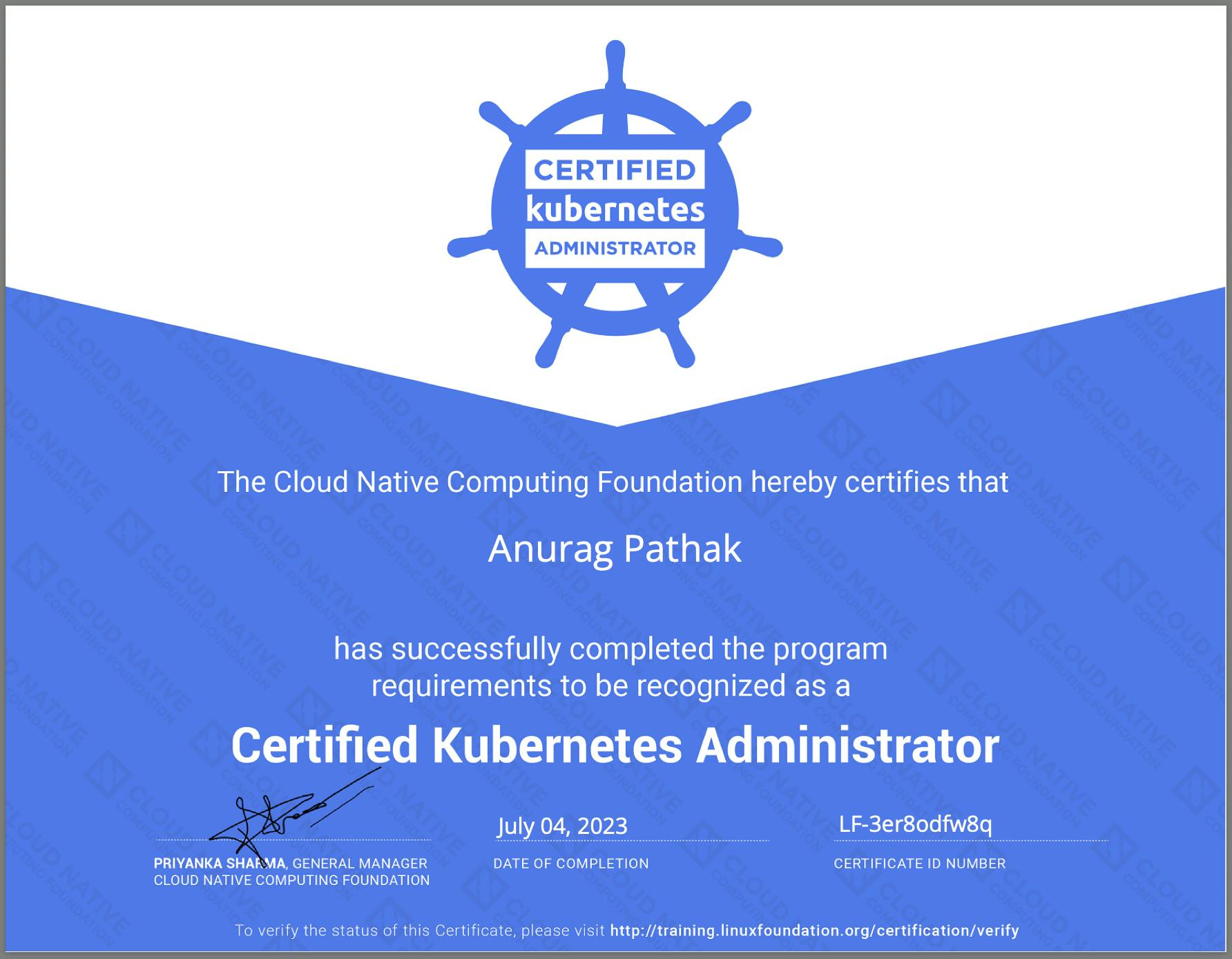How I passed the Certified Kubernetes Administrator (CKA) Exam in the first attempt while being a student?

Photo by Joseph Barrientos on Unsplash
Certified Kubernetes Administrator. Sounds like a fancy name, right? Now many of you might be wondering what it is, how to become one, and most importantly what's special about it.
Briefly speaking, CKA is a certification program offered by the Cloud Native Computing Foundation (CNCF) in collaboration with the Linux Foundation. It allows the examinees to demonstrate their skills in administering a Kubernetes cluster in a hands-on, command-line environment. It's special because it assures that those who get certified from it have the skills, knowledge, and competency to perform the responsibilities of Kubernetes administrators.
About the exam
It is an online, proctored, performance-based test that requires solving multiple issues from a command line. The exam has to be taken on PSI's Proctoring Platform "Bridge", using the PSI Secure Browser (a web browser created to guarantee a secure exam delivery over a virtual connection). The duration of the exam is 2 hours and its cost is $395 without discount. You get two chances to pass. You can find the curriculum here. Note that the curriculum is updated with the release of a new major Kubernetes version. To learn more about the exam, visit the official website for CKA.
My background
I'm currently a 4th year B. Tech. CSE student at NIT Silchar. I was an LFX Mentee in the Summer of 2022 and worked on the OpenELB project of CNCF. I am also a recipient of the Subhra Kar LiFT Scholarship 2022 in the Cloud Captain category. I got the CKA exam for free with it, along with the Kubernetes fundamentals course by the Linux foundation. You also do not need to pay the full price. You can find some heavy discounts but limited-time discounts from Linux Foundation itself. To stay updated, you may follow this official Linux Foundation Training & Certification account on Twitter. You can also find some coupons that work throughout the year from some sources like KodeKloud.
Preparing for the exam
I resumed my Kubernetes at the beginning of my vacation at the end of the third year of college. I didn't complete the Kubernetes Fundamental course earlier, so I resumed it first and completed it by almost June 8th, 2023. Then I started thinking about CKA. Firstly, I started learning about CKA from youtube. I watched nearly 4-5 videos but found only this one practical and convincing to me. I also discussed what to do next with people in the KubeSimplify community on Discord. Finally, I decided to buy the CKA course by KodeKloud on Udemy on June 10th for Rs 500. Taking the course was essential for me as I knew only basic stuff related to Kubernetes earlier, and that was less than 25% for the exam probably.

With less than 30 days left, I had a lot of things to learn and practice (since my exam was expiring on July 7th, 2023). I started the course by watching the video tutorials and doing the labs in a strict order. You may note that I treated almost all the labs like a real exam (with a few exceptions). I tried to complete the 1-hour labs in 10-40 minutes, depending on the difficulty, and using the official Kubernetes documentation only. I was serious about my accuracy as well and maintained near 100% accuracy in most of the labs. After the lab, if I had doubts about any questions (including the way of solving them to doubts in concepts to optimization) used. I also avoided using YAMLs as far as possible and relied on the Kubectl wherever possible. I also used the templates provided in the docs wherever suitable. So all of these helped me to solve the problems quickly during the exam. Towards the end of the course, I ended up having a good idea in memory of whether to use Kubectl or directly copy a specific template depending on the situation in memory.
Mock tests
Finally, I completed the learning part and practice labs by July 27th (nearly 18 days) and started practicing the mocks provided with the course only. I tried 2-3 in a day. So was done with it in 2 days. My score was above 85% in all, except one where I scored only 70% with bad time management. Still, I was pretty confident as my overall accuracy was quite good, and I earned a satisfactory amount of knowledge and experience from the course.
The next step and final step was to try the killer shell mocks that one gets for free with the CKA exam, which is infamous because of the difficulty level. I attempted my first one and scored only 35/135, which is nearly 28%. Even though my main problem was time management (because the mock was almost 1.5-2 times lengthier than the actual exam), I also slipped a little in accuracy. It was significantly disappointing for me, and I decided to delay the actual exam by 2-3 more days and scheduled it for 3rd July after spending a good time on the solutions of the mock and 2-3 retakes. BTW both the killer shell mocks have the same set of questions, it is just for providing you with 36 + 36 hours of test environment separately (you can view the solutions even after a mock expire).
Taking the exam
My exam was scheduled for 11.30 AM. Since I knew that I have already learned almost everything I could and now I only had to stay calm during those 2 hours and solve questions quickly using my existing knowledge, I didn't study since the evening of July 2nd. I slept well (didn't oversleep either, as it also leads to drowsiness), and during the morning just relaxed in nature.
Finally, it was almost time for the exam. I removed clutters from my room so the proctors didn't ask me to change anything. Simply showing them the room and the setup worked. You may find about the pre-exam preparation here.
Conclusion

The next day at nearly 11.30 AM, I received my results. I passed with 77/100 marks. Obviously, my exam didn't go perfectly, and I'll be noting the major mistakes I made during the exam so that you can avoid those.
Spending too much time on a single question: Unlike other exams, this exam also consists of a mixture of easy, medium, and hard questions. So if you complete the easy and medium questions first in a limited time, you can have a reasonable time to attempt the hard ones and in fact, solve a few of those. I, unfortunately, spent nearly 60-70 minutes on the first four questions, mainly the 3rd and 4th ones. As a result, I had to complete the rest of the questions very fast, and I didn't even get time to check if I did everything correctly or not. I only managed to do almost all questions that fast only because of the practice.
Taking the Killer shell mocks very seriously: I spent nearly 3-4 days on the killer shell mocks. That's not wrong, but what went wrong with me is that while spending too much time on the same set of questions, I started slightly forgetting the things that I learned from KodeKloud. But, in reality, KodeKloud covered literally everything needed for the exam, and most of those were important. So reattempting all the KodeKloud labs and mocks in 2-4 days and then taking the exam could've been a better approach, in my opinion.
There are no easy or hard topics, it just depends on the question: I initially thought that a few topics, like ETCD, Cluster upgrade, and Persistent volumes could never contain hard questions. But the exam proved me wrong, and that mentality cost me little during the exam in correspondence to point number 1. In fact, the network policy topic, which is usually hard and confusing, can become very easy depending on the question.
I hope you got some good ideas about CKA from this blog and some insights to assist you during the preparation. You may note that I was able to complete my in less than a month because I already had a good understanding of Kubernetes from a developer's point of view. So in your case, some more time may be needed, which is absolutely fine, and you should take it. Just work hard and learn with dedication. Best of luck if you are planning to take the exam anytime soon, and never give up.
If you have anything to ask/suggest feel free to comment here or reach out to me on Twitter or LinkedIn. Below attached is my certificate. Alternatively you can also find the badge on Credly.
